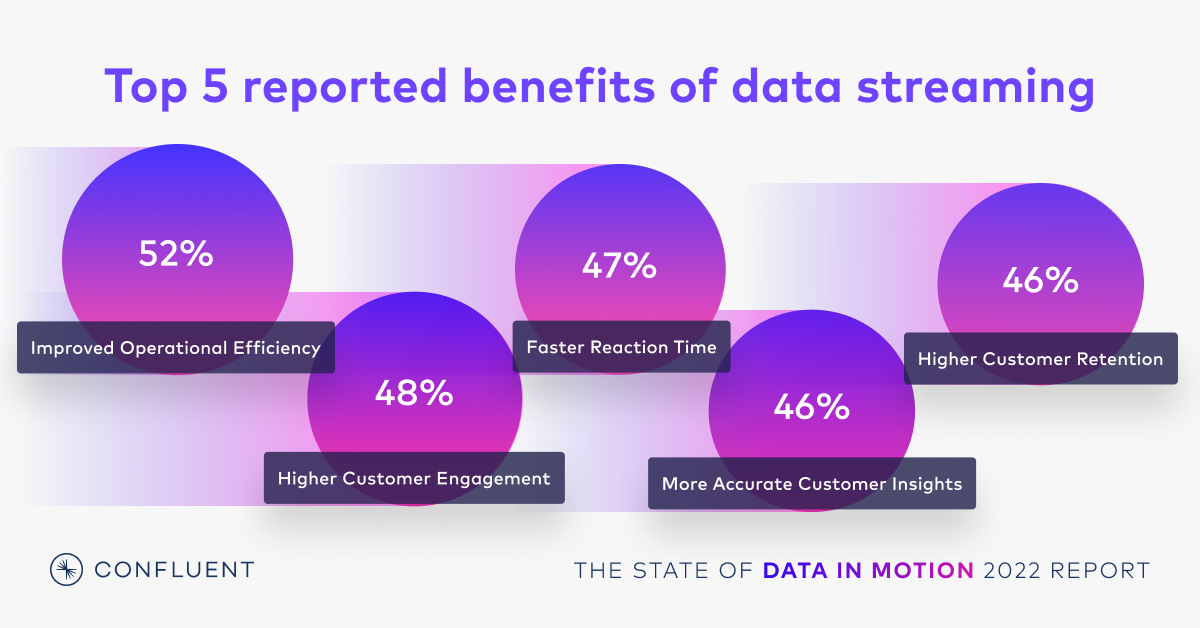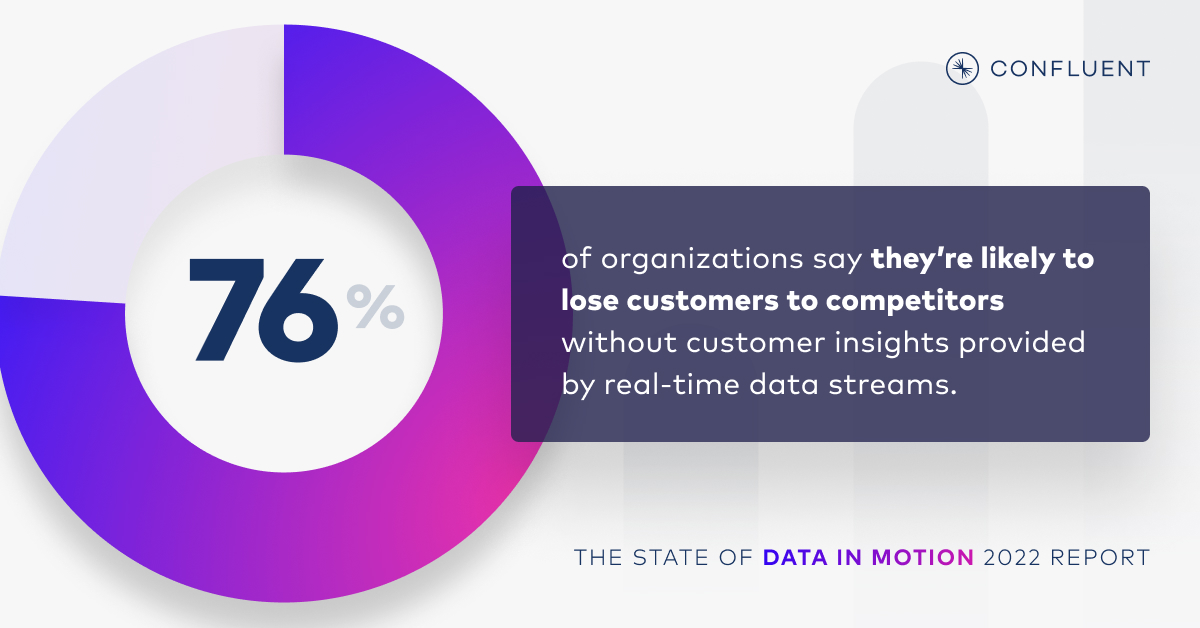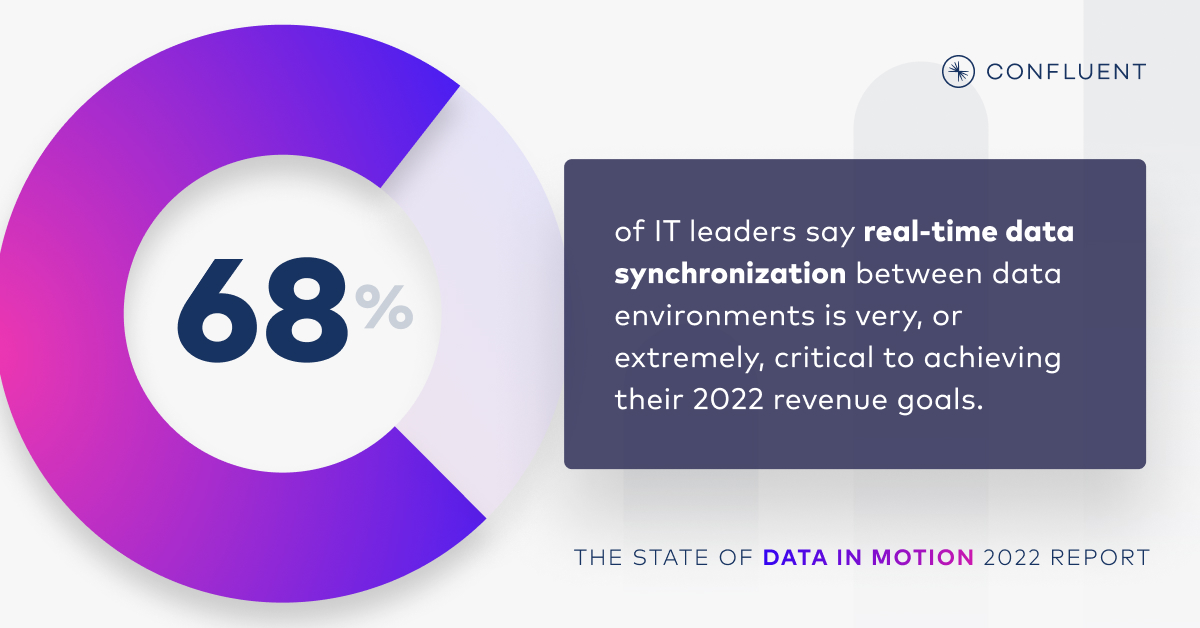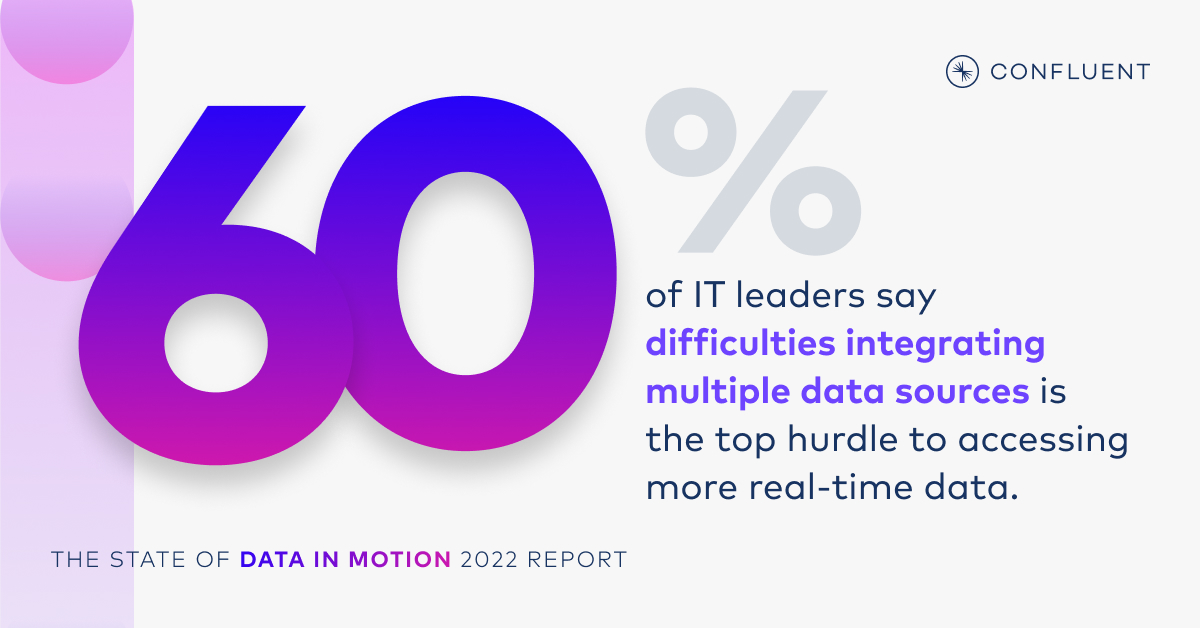[Webinar] AI-Powered Innovation with Confluent & Microsoft Azure | Register Now
The Results Are in From The First Ever Data in Motion Report
There’s an increasing need for businesses to act intelligently and in real time to win in today’s digital-first world. To achieve this, forward-thinking companies are modernizing their data infrastructure with real-time data streams—what we call, “data in motion.” In order to capitalize on strategic opportunities enabled by real-time data, many businesses have begun to use data streaming platforms to help create better experiences for their customers, as well as run data-driven operations.
This is a big shift for businesses, and we know the transition won’t happen overnight. A common concern we hear from our customers is that it’s often difficult to know where to start with data streaming.
To help our customers better understand the emerging data streaming industry and how to navigate it, Confluent partnered with Lawless Research for our first-ever global survey of 1,950 IT and engineering leaders on their use of data streaming and real-time data.
The result: our just-released State of Data in Motion report, which highlights the value of putting your data in motion—and sheds light on the challenges you might expect to encounter along the way. The report explores where organizations are seeing triumphs and roadblocks associated with the widespread adoption of data in motion—and where it can get easier.
One big takeaway: Laying the groundwork for a strategy that prioritizes organization-wide access to real-time data streams can be hard, but the many positive business outcomes make the effort worth it.
Let’s take a look at some of the key findings.
Data in motion: Key driver of growth and customer satisfaction
Adopting a data streaming platform enables companies to harness data flow across the organization and react to it continuously. Streaming helps organizations integrate data from a huge range of disparate sources to create a universal data pipeline—a single source of truth for all data within the business. And the good news is that organizations are beginning to realize that real-time data streaming is key to accelerating agility, innovation, and growth.
In fact, a majority of IT and engineering leaders (97%) we surveyed have access to some degree of real-time data streams, which they’re using to:
- Accelerate revenue growth: 56% of IT leaders with widespread access to real-time data streams reported revenue growth higher, or much higher, than their competitors
- Boost customer engagement: Eight in 10 organizations say that real-time data streams are very, or extremely, important to building rich customer experiences
- Drive business efficiency: More than eight in 10 leaders say real-time data streams are critical to responsive business processes for employees—with 52% citing improved efficiency as the top benefit

And the benefits don’t just end there, according to the survey. The value of adopting data streaming technology is clear in a wide variety of applications across various industries. Retail organizations, for instance, can deliver superior customer engagement across all channels, and financial institutions can ensure regulatory compliance and mitigate cyber risks.
“Real-time data streams are becoming core to how we serve customers and run our business. With quality data in motion, we can manage customer engagement, ensure vaccine and testing accessibility for patients, and enable a differentiated online retail proposition. An organization-wide IT modernization effort has led to an increasingly seamless omnichannel experience wherever customers choose to interact with us, across our pharmacies, retail stores, or online and mobile properties.” – Yaël Gomez, Vice President, Global IT, Integration and Intelligent Automation, Walgreens Boots Alliance
With so many companies tapping into real-time data streams to optimize and elevate the business, it comes as no surprise that those that hesitate to make the transition are at a distinct disadvantage with customers. In fact, three in four organizations say they would lose customers without access to the insights they glean from real-time data streams today.

Harnessing real-time data streams: Key challenges to note
While real-time operations and experiences are what set organizations apart in today’s digital world, we know the path to harnessing real-time data streams isn’t devoid of challenges. And according to our survey results, many of these results can be attributed to difficulties that emerge as businesses move more workloads to the cloud and use multiple cloud providers.

In fact, IT leaders have identified real-time data synchronization between multiple environments as a key challenge for achieving true data in motion. That’s because as more businesses move their on-prem data to the cloud, it’s creating more data synchronization, access, and governance problems, our report found.
Data integration across multiple sources emerged as another pain point for IT leaders. The key driver behind this challenge is the explosion in the number and variety of data sources.

The outcome? It can pose a barrier against providing your customers with personalized, on-demand experiences. This is simply because building next-generation applications that make these experiences possible requires data integration across disparate sources—and in a timely fashion.
The good news? At Confluent we’re dedicated to helping companies overcome these hurdles and empowering them with real-time data in motion. Confluent delivers a fully managed, cloud-native data streaming platform, that provides all the tools you and your team will need to unlock powerful new use cases with full scalability, performance, and reliability.
Whether you’re just getting started with real-time data streaming, or further along on the journey, download the report to see why setting your data in motion is key to your next chapter of success.
Avez-vous aimé cet article de blog ? Partagez-le !
Abonnez-vous au blog Confluent
Confluent Cloud for Government Is Now FedRAMP Ready
Confluent achieves FedRAMP Ready status for its Confluent Cloud for Government offering, marking an essential milestone in providing secure data streaming services to government agencies, and showing a commitment to rigorous security standards. This certification marks a key step towards full...
Bridging the Data Divide: How Confluent and Databricks Are Unlocking Real-Time AI
An expanded partnership between Confluent and Databricks will dramatically simplify the integration between analytical and operational systems, so enterprises spend less time fussing over siloed data and governance and more time creating value for their customers.

